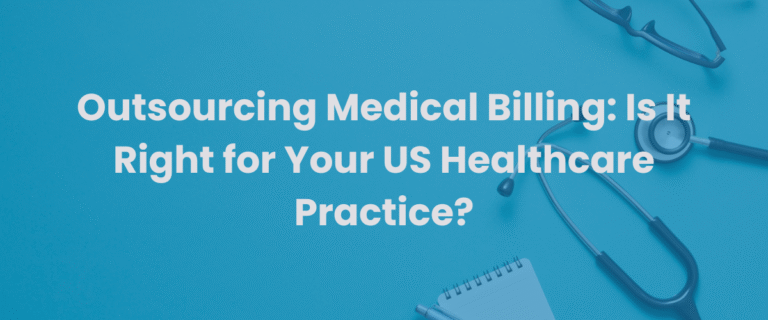Outsourcing medical billing has become an increasingly popular solution for healthcare practices of all sizes. As medical billing processes grow more complex due to evolving regulations, coding standards, and payer requirements, healthcare providers face the challenge of balancing patient care with efficient financial management. Medical billing services and medical billing and coding services offer a practical solution, enabling providers to streamline revenue cycle management and focus on their core mission: patient care.
This article explores the key benefits of outsourcing medical billing for healthcare practices and how this strategic decision can improve financial outcomes, reduce administrative burden, and enhance patient satisfaction.
What is Outsourced Medical Billing?
Outsourcing medical billing involves partnering with a specialized medical billing service or company to manage billing, coding, claims submission, and revenue collection on behalf of a healthcare provider. These companies handle tasks such as:
- Insurance Verification
- Medical Coding for Procedures and Diagnoses
- Claim Preparation and Submission
- Payment Posting and Reconciliation
- Denial Management and Follow-up
Medical billing and coding services leverage expertise, technology, and streamlined processes to ensure maximum efficiency and compliance.
1. Improved Revenue Collection and Cash Flow
Accurate Claim Submission
One of the primary benefits of outsourcing medical billing is the reduction in claim errors. Professional billing companies employ certified coders and billing experts who ensure accurate and compliant claim submissions. This reduces the likelihood of denials and rejections, leading to faster reimbursements.
- Impact on Cash Flow: Fewer errors mean that payments are processed quickly, reducing delays in revenue collection.
Denial Management
Medical billing services actively monitor denied claims and implement corrective actions to resubmit them promptly. Their expertise ensures higher claim acceptance rates.
- Revenue Boost: Practices recover revenue that might otherwise have been lost due to improper claim handling.
2. Cost Savings
Reduced Overhead
Managing an in-house billing department requires significant resources, including salaries, benefits, training, and technology. Outsourcing eliminates these costs, allowing practices to allocate their budgets more effectively.
- Savings Example: Practices can avoid expenses related to hiring billing staff or investing in billing software and infrastructure.
Scalability
Outsourced medical billing services are scalable, meaning healthcare providers can adjust their needs based on patient volume without incurring additional staffing costs.
- Flexible Costs: Practices save money during periods of lower patient volume while still maintaining high-quality billing services.
3. Enhanced Compliance and Reduced Risk
Regulatory Expertise
Medical billing companies stay updated on the latest healthcare regulations, including ICD-10 codes, CPT codes, and payer policies. They ensure compliance with standards such as HIPAA to protect sensitive patient information.
- Risk Reduction: Practices avoid penalties, audits, and legal issues by relying on experts who understand the complexities of medical billing and coding.
Fraud Prevention
Accurate billing processes reduce the risk of fraud and errors, which can lead to legal consequences and reputational damage.
4. Increased Efficiency and Productivity
Focus on Patient Care
Outsourcing medical billing allows healthcare providers and staff to focus on delivering high-quality care rather than managing administrative tasks.
- Improved Patient Outcomes: With more time devoted to patients, providers can enhance their quality of care and strengthen patient relationships.
Streamlined Operations
Billing companies utilize advanced technology, including automated workflows and analytics, to streamline the billing process and identify inefficiencies.
- Operational Benefits: Practices experience faster claim processing, better reporting, and fewer administrative headaches.
5. Access to Advanced Technology
Cutting-Edge Tools
Medical billing services use the latest billing software, analytics tools, and automation technologies to optimize revenue cycle management.
- Data Insights: Advanced analytics provide valuable insights into financial performance, helping practices identify areas for improvement.
Seamless Integration
These companies often offer integration with Electronic Health Record (EHR) systems, ensuring a smooth flow of data between clinical and financial operations.
- Improved Workflow: Seamless integration eliminates redundant data entry and reduces errors.
6. Better Patient Satisfaction
Transparent Billing
Outsourced billing companies provide clear, accurate, and transparent bills, which help reduce patient confusion and frustration.
- Patient Trust: Patients appreciate accurate and understandable billing, which improves their overall experience.
24/7 Support
Many billing services offer patient support lines to handle billing inquiries and resolve payment issues.
- Convenience for Patients: Access to dedicated support improves satisfaction and speeds up payment collection.
7. Scalability and Flexibility
Handling Growth
As practices expand, their billing needs become more complex. Outsourced medical billing services can easily scale to meet these growing demands without requiring additional resources from the practice.
- Seamless Expansion: Providers can focus on growth without worrying about increased administrative burdens.
Adapting to Change
Billing companies are well-equipped to handle changes in payer policies, regulations, or technology trends.
- Future-Proofing: Practices remain compliant and competitive as the industry evolves.
Common Concerns About Outsourcing Medical Billing
1. Loss of Control
Some providers worry that outsourcing billing will result in a loss of control over financial operations. However, reputable billing companies provide regular reports and maintain open communication to keep providers informed.
2. Data Security
Data security is a valid concern when outsourcing medical billing. HIPAA-compliant companies use robust encryption and security protocols to protect sensitive information.
How to Choose the Right Medical Billing Service
To maximize the benefits of outsourcing, healthcare providers should select a billing partner that aligns with their needs. Key considerations include:
- Experience: Look for a company with expertise in medical billing and coding services for your specialty.
- Technology: Ensure the company uses modern tools and integrates seamlessly with your existing systems.
- Transparency: Choose a partner that offers detailed reports and maintains clear communication.
Reputation: Research client reviews and testimonials to assess reliability and performance.
Conclusion
Outsourcing medical billing offers numerous benefits for healthcare practices, from improved revenue collection and compliance to reduced costs and enhanced patient satisfaction. By partnering with a reputable medical billing service, providers can focus on their core mission of patient care while optimizing their financial performance.
As the healthcare landscape continues to evolve, outsourcing medical billing and coding services is not just a convenience, it’s a strategic decision that can drive growth, efficiency, and long-term sustainability for healthcare practices.




